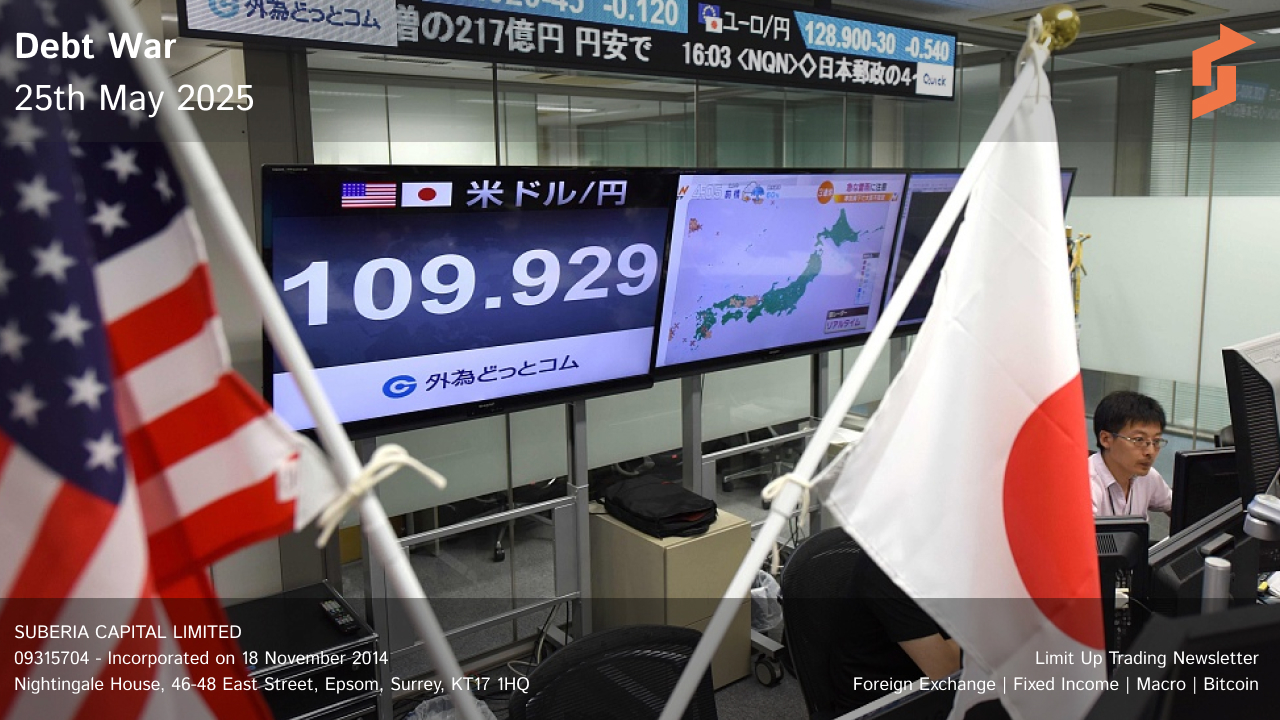Debt War
Podcasts | Daily LinkedIn | Weekly LinkedIn | Check out the website
Overnight

Economic Indicators Released Friday
UK consumer seems to be doing better, German GDP higher than expected at 0% YoY in Q1 is not much of beat, and mixed Canadian retail sales.
All of which were completely ignored by the markets as they focused on Trump threatening the EU with 50% tariffs and Apple with 25% tariffs on iPhones not made in the US. After a small sell off, markets then ignored that news as well.
There wasn't much today on long rates / refunding / Supplementary Leverage Ratio so a quiet day as all other news is now irrelevant.
Trump pushes EU to cut tariffs or face extra duties [FT]
Equities were down but not out.

US Equities
Breaking
Bessent Sees Easing Capital Rule on Treasuries This Summer [Bloomberg]
Debt War
This week brought to a head, 40 years of currency and debt imbalances. The 2 countries involved rewrote the global economy post World War 2 to create a massive boom that has given us a secular 40 year bond bull market, but it's now over because both counties are simultaneously insolvent.
This week a Japanese 20 year bond auction effectively failed and so did a US 20 year bond auction. Together in the same week.
In September 1985, G5 ministers met in the Plaza Hotel in New York to decide the future of Japan. It wasn't billed that way but that's how it played out.
After World War 2, Japan was bankrupt and run by the US. Japanese workers are clever and hard working so America decided that the expansion of the US could now be propelled by cheap goods from Japan. Sound familiar? At an exchange rate of 300+ YEN to the USD, it was a no-brainer and both the Japanese and US economies thrived.
By the 1980s however, Japan was a mighty economy, like China now, the manufacturer of cheap goods for the world. It was such a mighty economy that now America was scared of losing it mantle of number 1 and possibly the loss of the global reserve currency.
Fast forward to 1985 and the Plaza Hotel.
The Plaza Accord was probably the most dramatic policy initiative in the dollar foreign exchange market since Richard Nixon originally floated the currency in 1973. At the Plaza Hotel in New York on September 22, 1985, US officials and their counterparts among the Group of Five largest industrialised countries agreed to act to bring down the value of the dollar. Public statements from the officials were backed up by foreign exchange intervention, selling dollars in exchange for other currencies in the foreign exchange market.
In reality it was to make the YEN stronger so as to limit Japan's price competitiveness. USD / YEN went from 200+ to 120 before bouncing to 160. These numbers rhyme now.
Now Japan was a rich country but had a waning industrial base. Japanese companies and high net wealths went on a real estate binge whose bubble bursting in the 1990s and USD / YEN at 80 led to an economic depression that still exists today. 30 years.

USD / YEN Monthly
Fast-forwarding to today, Japan is insolvent;
The Bank of Japan owns 52% of all domestic government bonds.
Japanese life insurers, banks, and pension funds hold 13%, 9%, and 8%, respectively.
According to Bloomberg, the Japanese government now has US$7.8 trillion of debt. This makes the Japanese government the third most indebted government in the world, behind the US and China.
Furthermore the Bank of Japan holds a whopping $4.1 trillion of government bonds on its balance sheet.
The Japanese government bond market is in trouble [FT]
"Quasi-governmental entities like Japan Post, Norinchukin, and GPIF together own over a trillion dollars of foreign bonds. The government could urge them to support the Japanese bond market. But that would likely involve selling their foreign bond holdings — most likely Treasuries — to buy JGBs. With Japan-US tariff negotiations under way, does Japan really want to be seen as the reason Treasury yields keep rising?"
This week, despite equities shrugging off the tariff news, the USD plunged and closed at the low, 98.650 on the DXY. It's lost 10+ percent this year.

DXY Daily
So now the US and Japan have to face the future. There's no way out of the debt without a default.
Maybe there's something to be said for both or maybe all countries to default simultaneously, or perhaps a better way would be to let markets float free from intervention or manipulation so true price discovery can take place.
No politician would go for that idea.
Precious Metals / Commodities
Gold staged a spectacular recovery on Friday and Monday's Asian opening could see it gap a lot higher. Continual buyer demand and one very large buyer, means any dip should be bought.

GOLD / USD Daily
Bitcoin (& Crypto)
BTC hit a new high around 112k and has taken a pause over the weekend after EU tariff news prompted some profit taking.

BITCOIN / USD Daily
CRE / Banks / CLOs
 |
 |
 |
|
 |
|
 |
A lot more transactions happening in CRE and portfolio bankruptcies starting to filter through.
United States

US Economic Indicators
Government debt is the big issue. Although deficits are the front and centre, as well as too much consumption of cheap imports, massive fraud in the previous administration and a new President bent on alienating friend and foe alike, when you have to continually roll over staggering amounts of debt, there's just no room for manouevre.
China

China Economic Indicators
First rate cut since October of 10bps, why bother? Strengthening currency isn't helping for once either.

USD / CNH OFFSHORE YUAN Daily
Japan

Japan Economic Indicators
Government debt is the big issue. And it's time to pay the piper as that can has been kicked down the road for 30 plus years.
A big move in USD / YEN coming if the huge head and shoulders pattern plays out.

USD / YEN Daily
Japan’s Top Life Insurer Says Unrealized Bond Losses Tripled [Bloomberg]
Japan Signals Intent to Reach US Tariff Deal by G-7 in June [Bloomberg]
Europe

EU Economic Indicators
More rate cuts surely to come as EU economies try to grow amidst tariff fears.
United Kingdom

UK Economic Indicators
The economy is picking up but so is inflation, and the GBP is surging, helped by USD weakness.
Government debt is a big issue too.

Canada

Canada Economic Indicators
Inflation in Canada now stubbornly steady and above target. The currency has strengthened against it's biggest trading party ahead of tariff news. In limbo..

USD / CAD Daily
Australia

Australia Economic Indicators
Not much good news in Australia, as we've just elected a government on the basis that the other party was unelectable. Feels like the UK and having to wait until 2029 for the opportunity to get rid of Starmer.
Looks like more rate cuts to come as RBA discussed 50bps before deciding on 25bps.
Trouble is, more cuts equals more wealth inequality, and that is becoming a very big issue now.
The economy is stagnant and relies on government spending to survive.
Government debt is becoming the big issue.
Aussie dollar will come under pressure when the USD consolidates.
Huge public spending secures soft landing [AFR]
Australia's Unrealized Gains Tax Will Be A Lesson In Economic Suicide [Zerohedge]
Interesting
What's Next?
FED minutes may give us some idea on how coherent the committee are, but any disagreement would probably be hidden anyway. The pressure on them must be overwhelming.
Core PCE for April will be a good guide to whether the TRuflation prediction of rising inflation is playing out.
Otherwise let's trade headlines again.
This Week's Important Economic Indicators [London time]
![This Week's Important Economic Indicators [London time]](https://vip.suberia.capital/hs-fs/hubfs/25052025/indicators.jpg?width=658&height=626&name=indicators.jpg)
 Ian Reynolds
Ian Reynolds




